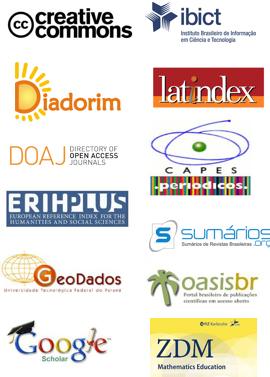Tarefas que Emergem em Atividades de Modelagem Matemática em um Ambiente Educacional de Cálculo Diferencial e Integral
DOI:
https://doi.org/10.17921/2176-5634.2017v10n1p23-40Resumo
As reflexões apresentadas neste artigo são resultados de uma pesquisa em que identificamos tarefas que emergem em aulas com modelagem matemática quando desenvolvidas em uma disciplina de Cálculo Diferencial e Integral. Para isso, nos fundamentamos nos pressupostos teóricos da modelagem matemática compreendida como uma alternativa pedagógica cujos encaminhamentos seguem as fases da modelagem e nas abordagens de tarefas enquanto ações para o desenvolvimento de uma atividade. Analisamos atividades de modelagem matemática desenvolvidas por três turmas do curso de Licenciatura em Química de uma universidade federal do Paraná. A opção metodológica para as análises e a codificação dos dados é de cunho qualitativo e segue encaminhamentos propostos na Teoria Fundamentada. A partir da codificação e análise dos dados consideramos agrupamentos realizados no que diz respeito a tarefas que emergem das atividades desenvolvidas concluindo que estas se relacionam com a situação em estudo, com a matemática que dela emerge e com o uso da tecnologia, configurando uma teoria fundamentada.
Palavras-chave: Educação Matemática. Modelagem Matemática. Cálculo Diferencial e Integral. Tarefas.
Abstract
The reflections presented in this article are results of a research in which we identify tasks that emerge in classes with mathematical modelling when developed in a discipline of Integral and Differential Calculus. For this, we based ourselves on the theoretical assumptions of mathematical modelling understood as a pedagogical alternative whose routing follows the phases of modelling and in the approaches of tasks as actions for the development of an activity. We analyzed mathematical modelling activities developed by three classes of the degree course in Chemistry of a federal university of Paraná. The methodological option for the analysis and the codification of the data is of qualitative character and follows directions proposed in the Grounded Theory. From the codification and analysis of the data, we consider groupings carried out with respect to tasks that emerge from the activities developed, concluding that they relate to the situation under study, to the mathematics that emerges from it and to the use of technology, forming a grounded theory.
Keywords: Mathematics Education. Mathematical Modelling. Integral and Differential Calculus. Tasks.


